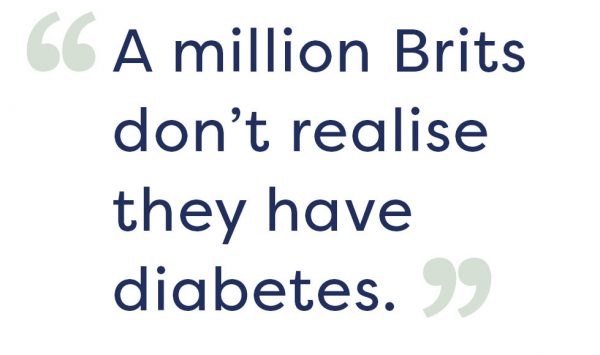Why seeing diabetes differently could save your life

Are you at risk of diabetes? Over four million Brits have the condition, so forget what you think you know about the disease and it could save your life.
Someone in the UK is diagnosed with diabetes every two minutes but, considering how common it is, there’s still a load of myth and stigma attached to the disease. Because of this, people might not think they need to reduce their risk, or get tested at the doctor’s.
It’s Diabetes Awareness Week and the theme for this year is all about seeing the condition differently. By realising it’s maybe not what you thought, you could end up doing yourself a massive favour for your future.
Remember – if you’re at all worried, get in touch with your GP as a first port of call.
So, first up – what is diabetes?
Diabetes is a condition when your blood glucose level is too high. Around 4 million people in the UK have diabetes, and it’s predicted there’s around another half a million of us out there walking around with it and don’t even realise.
There are two main types of diabetes – Types 1 and 2 – which are different conditions but both serious.
Type 1 Diabetes is a serious, life-long condition where your blood glucose level is too high because your body can’t make the hormone insulin. This tends to be a condition you’re born with.
Over 90% of people with diabetes have Type 2 Diabetes. It’s also a serious condition where the insulin your pancreas makes can’t work properly, or your pancreas can’t make enough insulin. Six in 10 people with Type 2 don’t show any symptoms when they’re diagnosed so it’s important to talk to your doctor about getting tested.
Type 2 Diabetes is a condition that tends to develop for a whole range of reasons, from age to ethnicity, genetics, pregnancy and lifestyle. By looking after yourself and following a healthy lifestyle you can reduce your risk of Type 2 and can actually put it into remission after developing it in some cases.
I’m not going to go too much into the risks of having undiagnosed diabetes, or not managing your condition if you do have it, but just know that they sound pretty serious.
Common symptoms of diabetes
So, now you’re up to speed on what it is, here are some of the condition’s most common symptoms.
- Going to the toilet a lot, especially at night
- Being really thirsty
- Feeling more tired than usual
- Losing weight without trying to
- Genital itching or thrush
- Cuts and wounds take longer to heal
- Blurred vision
Again, and I can’t stress this enough, if you’re worried go and see your doctor because I am in no way a medical professional.
Five things about diabetes everyone should know, according to Diabetes UK:
1. One in 15 of us live with diabetes.
One in 15 of us live with diabetes. That’s 4.7 million people in the UK – more than cancer and dementia combined. That includes one million people who don’t even know they have diabetes.
Chances are, lots of people you know are living with diabetes.
2. There are different types.
Type 1 and Type 2 are the two main types of diabetes. There are rarer types too. What they all have in common is they raise sugar levels in the blood. And that can seriously damage the body.
But there are differences in why they happen and how they’re treated.
3. Anyone can get it.
Why people get diabetes is complicated. Some things increase your risk of developing it, from genetics and ethnic background to gender, age and lifestyle factors. But sometimes it isn’t clear why people get it.
Anyone can get diabetes, at anytime. It doesn’t discriminate.
4. It’s not just tablets or injections.
It’s so much more than that. Every day involves a thousand little questions, decisions and things to remember. It’s appointments, checks, calculations, what to eat. It’s your care on your shoulders. It’s knowing things won’t always go to plan.
It’s day in, day out. It never stops. It’s relentless.
5. It never stops, but you don’t have to either.
When you’ve got diabetes, just getting through the day can be a monumental achievement. But it doesn’t mean life stops. People have become professional athletes, topped the charts and ruled the country with diabetes.
It might make life harder but it doesn’t have to change your ambitions or adventures.
If you’re an Onward customer concerned about your health or want to find out how to improve your lifestyle, get in touch with our Wellbeing team


